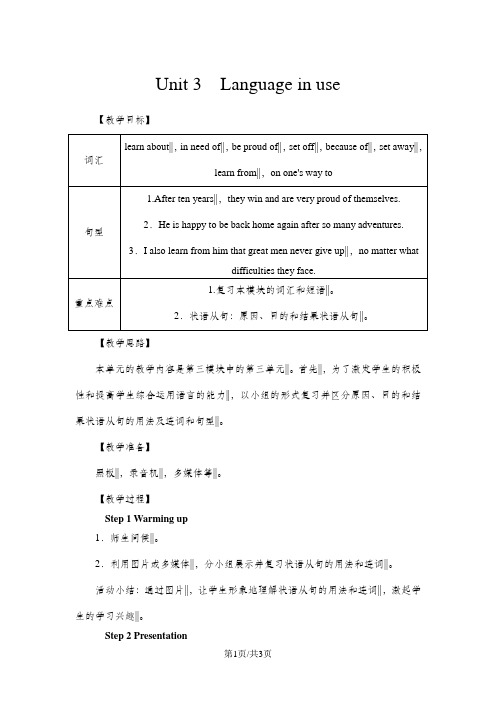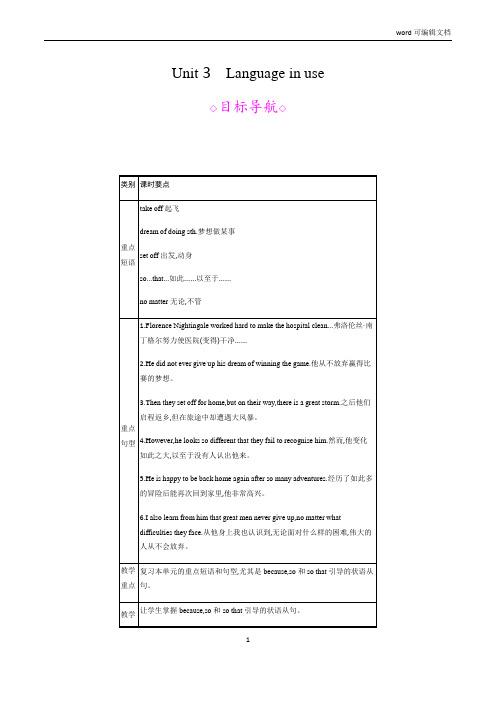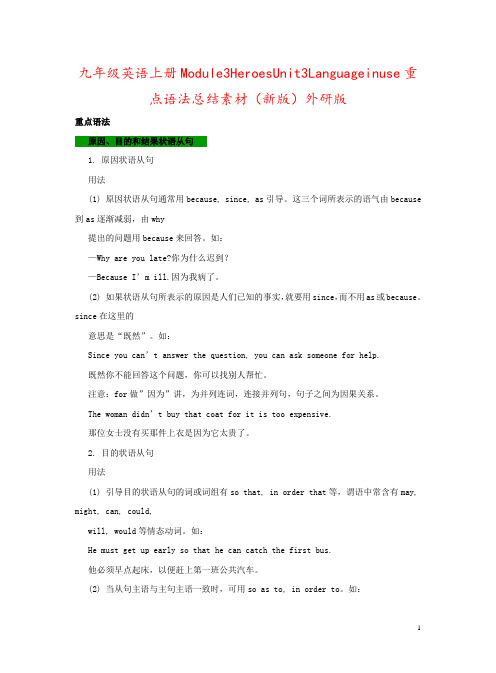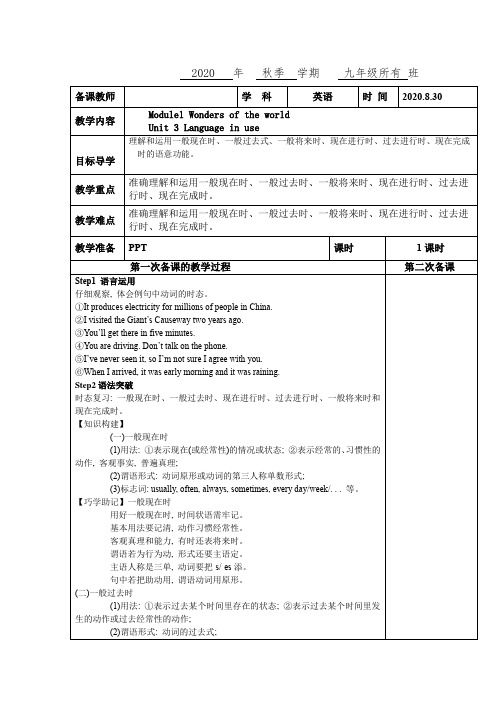外研版九年级英语上册教案:Module3 Unit 3 Language in use
- 格式:doc
- 大小:64.01 KB
- 文档页数:6

Module 2 Experiences一、教学内容:Unit3 Language in use二、课型:Revision and application三、教学目标:1. Get the students to be able to use the key vocabulary and new words they learn in thisunit2. To summarize and consolidate the adverbial clause of time.3. To be able to write a passage to introduce the festival.教学重难点:1.To be able to write a passage to introduce the festival.2.Through listening, speaking and writing, let students practise the adverbial clause oftime.四、教学准备:本节课型为Revision and application,根据新课标的要求,结合教材和学生特点,主要采用任务型互动式进行教学,结合情景法、交际法、听说法、归纳法等教学方法实施课堂活动,开启学生思维,通过一系列有条理的教学活动,引导学生自主探究学习和与他人互动合作学习,让学生体验愉快学习。
本节课所需教具及资料:幻灯、图片等。
五、教学过程:达标训练题一、单项选择1. Tom will call me as soon as he _____Shanghai.A. arrivesB. will reachC. arrives inD. get to2. The boy _____ to bed _____ his mother came in.A. went not; untilB. didn't go; afterC. went; untilD. didn't go; until3. When he got to the station, the train _____.A. leftB. had leftC. leavesD. has left4. We _____ TV when the telephone _____.A. watched; was ringingB. were watching; rangC. watch; ringsD. are watching; rang5. I _____ him since I began to live in the city.A. knowB. have knownC. knewD. will know6. It was evening _____ we reached the little town of Winchester.A. thatB. untilC. sinceD. before中考链接1. We didn’t start our discussion ________ everybody arrived. 【2011 上海】A. sinceB. ifC. whileD. until2. —Will you please give the dictionary to Jane?—Sure. I’ll give it to her_______ she arrives here. 【2011 广州】A. beforeB. untilC. becauseD. as soon as3. December is ________ month of the year. 【2013 湘潭】A. twelveB. the twelfthC. the twelveth4. On February 25, 2013, Li An, a Chinese director, won the best director again. It is his ___ time to win an “Oscar”. 【2013 东营】A. firstB. threeC. twiceD. second。

Module 1Unit3Language in useⅠ、Teaching model:Revision and applicationⅡ、Teaching method:Formal and interactive practiceⅢ、Teaching ObjectivesKnowledge objective1.To review the key words, phrases, and sentences of M1.2.To learn to use different tensesAbility objective1. To understand and use different tenses2. To learn to describe places and experiences.Moralobjective.To learn about the wonders of China and the world. Love our country, be proud of our country.Ⅳ、Teaching importance and difficulty1.To summarise and consolidate the use of articles2. To practise the new vocabulary and expressions.V、Teaching methodPWP method, task-based methodVI、Teaching aidsA tape recorder, multimedia and some picturesⅦ、Teaching ProceduresLearning Aims(学习目标)1.To review the key words, phrases, and sentences of M92.To use articles3. To learn to read large numbersStep 1:Review the knowledge(知识回顾)1.师友互查1)Review the phrasesgo through, fall away, on top of, look over, look across, look down,get out of , join in, agree with, man-made, more than, millions of,in one’s opinion2)课文原句在现1. I got out of the car, went through a gate and walked along a dark path.2. I looked over them, but it was silentand there was no sign of it.3. I looked down to the Colorado River4. Finally, I looked to my left and to my right.5. The sun rose behind me and shone ontherocks.Farbelowme,thegroundfell away and down to a river.6. I remained by the canyon for a bout half an hour…7.Let’s callWonder of the Worldand join in the discussion.8.I think the Giant’s Causeway is the most fantastic natural wonder.9. I think Victoria Falls in Africa is even more fantastic.10. But in my opinion, man-made wonders are more exciting than natural ones.(友情提示:师友朗读,理解记忆。



Module 3 Unit 3 重点词汇总结重点词汇including·原文再现She’s won many world competitions, including four gold medals in the Olympics.她赢了许多世界比赛,其中包括四块奥运会金牌。
·基本用法including prep. 包含;包括,和其后的名词/代词一起形成介宾短语。
There are 40 students in the classroom, including me.包括我在内,教室里有40名学生。
·知识拓展--相关单词1. include vt. 包括,包含;算在内,列在里面。
如:Is service included in the bill?帐单中包含服务费吗?2. included adj. 包括在内,无比较级和最高级形式。
如:Everyone laughed, me included.每个人都笑了,包括我在内。
medal·原文再现She’s won many world competitions, including four gold medals in the Olympics.她赢了许多世界比赛,其中包括四块奥运会金牌。
·基本用法medal n. 奖牌;奖章 gold medal 意为:金牌。
He got a medal for bravery.他因勇敢而获得一枚奖章。
They'll make a medal in memory of the great victory.他们将为纪念这一伟大的胜利制作一枚纪念章。
·知识拓展--词义辨析:prize/medal1. prize “奖赏,奖金,奖品”,多指在竞赛、竞争或抽彩中所赢得的奖。
这种奖赏有的凭能力获得,有的凭运气获得。
Hundreds of prizes can be won in our newspaper competition.参加我们报纸的竞赛可赢得数以百计的奖品。

Unit 3Language in use【教学目标】【教学思路】本单元的教学内容是第三模块中的第三单元||。
首先||,为了激发学生的积极性和提高学生综合运用语言的能力||,以小组的形式复习并区分原因、目的和结果状语从句的用法及连词和句型||。
【教学准备】黑板||,录音机||,多媒体等||。
【教学过程】Step 1 Warming up1.师生问候||。
2.利用图片或多媒体||,分小组展示并复习状语从句的用法和连词||。
活动小结:通过图片||,让学生形象地理解状语从句的用法和连词||,激起学生的学习兴趣||。
Step 2 Presentation利用多媒体呈现几组状语从句的句子||,让学生翻译并区分||。
Many people were dying because they did not get to hospital quickly enough.There were few doctors||,so he had to work very hard on his own.He wrote books so that they could learn about how he treated the sick.Step 3 Practice1.让学生独立完成Activity 1||,正确运用:because||,so||,so that||,并了解宇航员Yuri Gagarin的故事||。
2.利用Activity 2的句子和提示||,练习连词的用法||,并了解著名人物的事迹||。
3.利用Activity 3的问题||,进行小组活动||,练习原因状语从句中“because”的用法||。
活动小结:多种形式复习状语从句的连词的用法||,充分调动学生们的学习热情||。
Step 4 Complete the sentences1.Let students complete the sentences with the correct form of the words in the box.Then check the answers.(Activity 4)2.Let students complete the sentences with the correct form of the expressions in the box.Then check the answers.(Activity 5)Step 5 Listening1.让学生自己先看懂Activity 6中的问题||,两人或几人一组进行讨论||。

Unit 3 Language in use【教学目标】【教学思路】本单元的教学内容是第一模块中的第三单元。
首先,为了激发学生的积极性和提高学生综合运用语言的能力,让学生以小组的形式复习六种时态的用法及句型。
然后,利用多媒体和对话等多种形式,引导学生积极参与课堂活动。
最后,让学生运用本模块所学的重要词汇的正确形式补全句子。
【教学准备】黑板,录音机,多媒体,教学图片,巩固练习的幻灯片等等。
【教学过程】Step 1 Warming up & Leading in1.师生问候。
2.利用图片或多媒体,分小组展示并复习六种时态的句型及用法。
利用多媒体呈现含有六种时态的句子,让学生翻译。
(1)I visited the Giant's Causeway two years ago.(2)It produces electricity for millions of people in China.(3)r ve never seen it, so I'm not sure I agree with you.(4)I looked into the east一the sky was becoming grey.⑸You'11 get there in five minutes.(6)Am I going the right way?活动小结:通过图片,形象地区分六种时态的句型及用法,激发学生的学习兴趣。
Step 2 Presentation & Practice Language practice(1一3)(1)教师让学生看活动1中的第一组句子,让学生说说两个句子的不同。
a.I often play basketball.(一般现在时)I am playing basketballnow.(现在进行时)一般现在时:表示通常性、规律性、习惯性的状态或者动作(有时间规律发生的事件)的一种状态。

Unit3Language in use ◇目标导航◇难点◇教学过程◇预习指导一、方法指导练习由because,so和so that引导的状语从句。
尝试根据听力任务中的问题推测对话内容,并提前预习短文,标出不熟悉的单词或句型。
二、预习检测Ⅰ.同义句转换,每空一词1.Amanda didn’t go to work because she was badly ill.Amanda was badly ill so she didn’t go to work.2.They got up early so that they could catch the early bus.They got up early in order to catch the early bus.3.At last,Lily chose a Chinese magazine to read.In the end,Lily chose a Chinese magazine to read.4.Mary often goes shopping by herself in her free time.Mary often goes shopping on her own in her free time.Ⅱ.用方框中所给单词的适当形式填空way,read,hero,make,everything,win,act,because,by,proudStan Lee is a writer.He created many of our favourite 1.heroes.Spiderman,the Incredible Hulk and the Silver Surfer are just three of them.In his stories,the heroes always 2.win in the end.When he wasyoung,he loved to watch his favourite 3.actors in films.He wanted to create cartoon people just like them.He thought they were heroes 4.because they were brave and didn’t worry about danger.Real people in his life also helped Stan.His teacher told great stories,and made him love 5.reading.The books he read,especially books 6.by famous writers like Charles Dickens and Mark Twain,made him want to write.His mother was always 7.proud of him,and told him his work was good.Children often ask Stan how they can become writers.He tells them to read.He says they should read 8. everything not just their favourite kinds of books,or books by famous writers.He says that reading is the best 9.way to learn to write.Stan hopes that teachers can 10.make children want to learn.They can make history,geography,languages and science exciting.He says teachers should be more like actors,and make learning interesting.课堂教学Step1情境导入Teacher:Who’s your hero?Who can talk something about him/her?Now think about these questions:Who is he/she?Where and when was he/she born?What did he/she do?What can we learn from him/her?Step2语法练习1.阅读并分析Unit 3方框中的句子,小组内讨论,明确引导原因、目的和结果状语从句的连词的含义。

九年级英语上册Module3HeroesUnit3Languageinuse重点语法总结素材(新版)外研版重点语法原因、目的和结果状语从句1. 原因状语从句用法(1) 原因状语从句通常用because, since, as引导。
这三个词所表示的语气由because 到as逐渐减弱,由why提出的问题用because来回答。
如:—Why are you late?你为什么迟到?—Because I’m ill.因为我病了。
(2) 如果状语从句所表示的原因是人们已知的事实,就要用since,而不用as或because。
since在这里的意思是“既然”。
如:Since you can’t answer the question, you can ask someone for help.既然你不能回答这个问题,你可以找别人帮忙。
注意:for做”因为”讲,为并列连词,连接并列句,句子之间为因果关系。
The woman didn’t buy that coat for it is too expensive.那位女士没有买那件上衣是因为它太贵了。
2. 目的状语从句用法(1) 引导目的状语从句的词或词组有so that, in order that等,谓语中常含有may, might, can, could,will, would等情态动词。
如:He must get up early so that he can catch the first bus.他必须早点起床,以便赶上第一班公共汽车。
(2) 当从句主语与主句主语一致时,可用so as to, in order to。
如:He worked day and night in order that he could succeed.=He worked day and night in order to succeed.他夜以继日地工作为的是取得成功。

九年级英语上册教案(全一册共91页)目录Module 1Wonders of the worldUnit 1It's more than 2,000 years old.Unit 2The Grand Canyon was not just big.Unit 3Language in useModule 2Public holidaysUnit 1My family always go somewhere interesting as soon as the holiday begins.Unit 2We have celebrated the festival since the first pioneers arrived in America.Unit 3Language in useModule 3HeroesUnit 1She trained hard,so she became a great player later.Unit 2There were few doctors,so he had to work very hard on his own.Unit 3Language in useModule 4Home aloneUnit 1I can look after myself,although it won't be easy for me.Unit 2I became so bored with their orders that I wished they would leave me alone. Unit 3Language in useModule 5MuseumsUnit 1Don't cross that rope!Unit 2If you ever go to London,make sure you visit the Science Museum.Unit 3Language in useModule 6ProblemsUnit 1If I start after dinner,I'll finish it before I go to bed.Unit 2If you tell him the truth now,you will show that you are honest.Unit 3Language in useModule 7Great booksUnit 1We're still influenced by Confucius's ideas.Unit 2It is still read and loved.Unit 3Language in useModule 8Sports lifeUnit 1 Daming wasn't chosen for the team last time.Unit 2He was invited to competitions around the world.Unit 3Language in useModule 9Great inventionsUnit 1Will computers be used more than books in the future?Unit 2Will books be replaced by the Internet?Unit 3Language in useModule 10AustraliaUnit 1I have some photos that I took in Australia last year.Unit 2The game that they like most is Australian football.Unit 3Language in useModule 11PhotosUnit 1He's the boy who won the photo competition last year!Unit 2The photo which we liked best was taken by Zhao Min.Unit 3Language in useModule 12Save our worldUnit 1If everyone starts to do something,the world will be saved.Unit 2Repeat these three words daily:reduce,reuse and recycleUnit 3Language in useModule 1Wonders of the worldUnit 1It's more than 2,000 years old.【教学思路】本单元的教学内容是第一模块中的第一单元,通过提供必要的图片、背景等为学生创造一个全新的语言氛围。



2020 年秋季学期九年级所有班Module3 Heroes Unit3 Languages in use第一次备课的教学过程Step 1 Review(复习)· Talk about heroes with your partners.1.Who isyour hero and where does he/she come from?2. what does he/she do?3. why is he/she so important today?Step 2 Language practice1. Many people were dying because they did not get to hospital quicklyenough.2. There were few doctors, so he had to work very hard on hi s own.3. He wrote books so that they could learn about how he treated the sic k.Step 3 Grammar(语法小结)1. 原因状语从句从句表示的是主句行为的原因, 就是原因状语从句。
原因状语从句由表示原因的连词引导, 常用的是because。
e.g. He failed the exam because he was too careless.since也可以用来引导原因状语从句, 表示显然的或已为人所知的理由, 常译为“因为; 既然”。
e.g. Since everyone is here, let’s start. 既然大家都到齐了, 我们开始吧。
2. 目的状语从句如果从句表示的是主句行为的目的, 该从句就是目的状语从句。
目的状语从句可以由so that引导。
e.g. I got up very early so that I could get to school on time.为了能按时到校, 我很早就起来了。

Module3 Heroes Unit 3 Language in use单词including, medal, attend, abroad, doctor,学会用英语谈论学习方法。
掌握状语从句。
Step 1情景导入T: Let's play a game. Let's look for the sentences of adverbial clauses with because, so and so that.The person that finds the most and fastest will be the winner.Step 2完成教材Activities 1~7的任务1plete the passage with because, so or so that. (Activity 1)(1)学生个体活动,通读语篇,分析句子关系,完成填空。
(2)全班核对答案。
(3)学生大声朗读语篇,注意because, so和so that引导的状语从句。
2.Join the sentences with because, so or so that. There may be more than one answer. (Activity 2)(1)学生个体活动,连接句子。
(2)两人一组核对答案,部分学生展示。
用适当的连词完成句子。
①He put his glasses on so that he can see more clearly.②I was tired because I studied late last night.3.Work in pairs. Ask and answer. (Activity 3)环节说明:此活动的目的是让学生进一步感知几个连词引导的状语从句的不同。
4plete the sentences with the correct form of the words in the box. (Activity 4)(1)学生浏览方框中的单词,明确其含义。

九上Module 3 Unit 3 重点句型总结重点句型Who have you chosen to tell us about?你打算跟我们谈论谁?·基本用法choose to do sth 意为:选择做某事,如:On the other hand, many women choose to go out to work.另一方面,许多妇女又选择外出工作。
Why do so many people choose to leave their country?为什么有这么多人要离开祖国?She's my hero because she’s one of the best players in the world.她是我心目中的英雄,因为她是世界上最好的运动员之一.·基本用法这是because引导的原因状语从句,表示直接的原因,但because不能与so连用。
I was ill, so I had to stay at home。
Because I was ill, I had to stay at home。
我生病了,所以我不得不待在家里。
·知识拓展--词义辨析:as/because/for/since这四个词都可以用作连词,表“原因、理由”但有区别:1. as:因为;既然,表示的原因或理由是明显的.语意不如because强。
当理由是明显的,或者被认为是已知的时,则以用as 为好。
如:As he was not well, I decided to go without him。
因为他身体不好,我决定独自去了。
As it was getting very late, we soon turned back.因为已很晚了,我们很快就回来了.2. because:因为,表直接而明确的原因或理由,即必然的困果关系。
在这几个词中,它的语意最强。
回答以why 引导的特殊疑问句时,只能用because。
Unit 3 Language in useⅠTeaching modelListening, speaking and readingⅡTeaching method归纳总结强化训练能力提升Ⅲ Teaching aims:1. 掌握本单元单词和短语2.掌握Grammar(语法):原因状语从句,目的状语从句和结果状语从句.Useful phrases: be proud of =take pride in 以……为骄傲, set off 出发,开始on one‘s way to+地点,在某人去某地的路上get away 逃离no matter what 无论怎么样Ⅳ Teaching aids:Tape recorder, OHP, pictures, handoutsⅤ Teaching StepsStep 1:RevisionRevise the new words and phrases we have learned in unit 2.Step 2:Listening and vocabulary1. Learn how to use because, so, so that.2. Play the tape and have them read and follow. And then choose the best answer.Step 3:Explain the important and difficult points1.proud of =take pride in 以……为骄傲区别比较:proud是形容词性,pride是名词性,be proud of和take pride in后面都可以加sth. 或doing sth.区别就是在be和take上,一个是用be动词,一个用的是动词。
例:I‘m proud of helping others when they are in trouble.我为自己能在别人有困难时帮助他人而自豪。
I take pride in helping others when they are trouble.我为自己能在别人有困难时帮助他人而自豪2. Then they set off for home然后他们出发回家。
Set off1)开始旅程Set off for Europe. 开始欧洲之旅。
2)爆炸:引起爆炸Set off a chemical reaction. 发生化学反应3)区分:指出不同;区分Features sets him off from the croed.使他与人群分开的特征4)强调:通过对比引起注意;强调Set off a passage with red colour用红色强调一段。
常用词组(1) set about 开始:开始或出发set about doing sth.开始着手做某事。
Set about solving the problem. 着手解决(2) set out 着手:开始一个热切的计划;set out to do sth. 开始着手做某事He set out to understand why the plan had failed. 他开始明白为什么计划失败了。
(3) set apart1)留出,拨出:留出以备专用You must set apart some money for the future. 你必须留出一些钱来以备将来之用。
2)使引人注目(set apart from 从……中分离出来)Her high height sets her apart from her sisters.高高的个子使她在其姊妹中分外引人注目。
(4). set down1). 坐:使坐;坐下Set the baby down here. 让小孩坐这儿。
2). 记录:写下;记录We set down the facts. 我们记下事实。
3). 把……归于:由……引起;Let‘s set the error down to inexperience. 让我们把错误归于没有经验。
4). 着陆:(飞机)着陆The plane set down on the airport.飞机在机场着陆。
(5). set up1)直立:放于竖直位置He set up the statue in the square.他把雕像竖立在广场里2)组装:集合并装配Set up a new machine. 组装一台新机器3). 建立Set up a charity. 建立一家慈善机构3. ten more years on the way homeon one‘s way to+地点,在某人去某地的路上。
地点是home,there等地点副词时,省略to I met my old friend on my way to park.我在去公园的路上遇到了一位老朋友。
I can't enter my house because I've lost my key on my way home.我进不了自己的房子,因为在回家的路上我把钥匙丢了。
4. the only one who recognises him is his old dog.recognise vt.1)识别出某人[某事物];My classmate doesn’t recognise me because I cut my hair yesterday.我同学没有认出我,因为我昨天把头发剪了。
2) 承认…有效(属实); 认可;Recognise a new government承认新政府3) 承认[认清](某事物);I recognise no such thing.我不承认任何这类事情。
5. but he manages to get away. 但是他成功逃脱了get away 离开,脱身; 逃掉; 抽身; 拔身;1) 走开,离开:例句: She didn‘t get away until nine last night.昨晚九点她才离开。
2). 逃走,跑掉;逃离犯罪现场:例句: I caught three mice,but one got away.我逮住了三只耗子,但有一只逃脱了。
3). 休假:例句: I couldn‘t get away a t all last year,I was too busy.去年我根本不能休假,我太忙了6. I also learn from him that great men never give up, no matter what difficulties they face.no matter与疑问词who, what, where, when, how, if, whether等连用,意为“无论,不管”。
如:1)Don‘t open the door, no matter w ho comes. 不管谁来都别开门2) Don‘t trust him, no matter what he says. 无论他说什么,都别相信他。
3) No matter where you work, you can always find time to study.无论你在哪里工作,你都能找到时间学习。
Step 4:Grammar box: 状语从句总结1.时间状语从句由as, after, as soon as, before, since, until , when ,whenever, while 等连词来引导As he explored the sea, he took a lot of pictures. 他探海的时候拍了很多照片。
As soon as he arrivied in France, he called me. 他一到达法国就给我打了电话。
He has been in Shanghai since he was born. 自他出生以来他就一直在上海。
Don’t come in until you are called. 除非你被叫到,否则不要进来。
Whenever we’re in trouble, he’ll help us. 无论何时只要我们有困难,他都会帮助我们。
While I was watching TV, the bell rang。
我正在看电视的时候,门铃响了。
2. 原因状语从句常用引导词:because, since, asI didn’t go surfing, because it was too cold.我没有去冲浪,因为太冷了。
As the car is expensive, we can’t buy it.因为车太贵了所以没有买。
Since he was busy, he didn’t come. 他太忙了所以没有来。
3. 目的状语从句常用引导词:so, so that, in order thatWe’ll sit near the front so we can hear the speaker better.我们坐在前面,这样可以更好地听演讲。
He sat in the dark so that he couldn’t be seen.坐在暗处,这样的话不容易被发现。
4. 结果状语从句常用引导词:so, so… that, such … that,He was so weak that he couldn’t walk on.他如此虚弱所以不能走路。
He got up so early that he caught the first bus.他起的如此早,这样他就能赶上头班车了。
It’s such a good chance that we must not miss it. 这是一个很好的机会我们不能错过了。
5. 比较状语从句常用引导词:as (so)…as , than 等引导She is not so (as) bad-tempered as her mother. 她脾气不像她母亲那样暴躁。
The house is three times as big as ours. 这房子比我们的大三倍。
6. 条件状语从句常用引导词:if, unlessWe’ll start our project if the president agrees. 如果总统同意,我们就会开始我们的项目。
If you travel in India, you can use English everywhere.如果你去印度旅游,再任何地方你都可以使用英语。